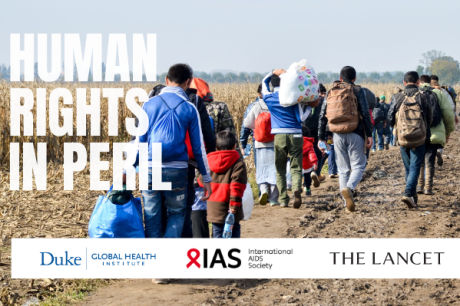
Jemima Kamano of Moi University and Paul Park
Published November 24, 2015, last updated on June 3, 2020 under Research News
Paul Park, a 2013 graduate of the Master of Science in Global Health program at the Duke Global Health Institute, is making a significant impact on non-communicable disease (NCD) care in sub-Saharan Africa. Park, a former resident with the Hubert-Yeargan Center for Global Health and Fogarty Global Health Fellow, is currently serving as the director of NCD at Partners in Health (PIH) - Rwanda.
Park, along with global health research scholar Joseph Egger and asssistant professor of global health and medicine Gerald Bloomfield, recently published a manuscript in Diabetes Care on results of a proof-of-concept study in Kenya. The study used the model of diabetes self-management support through peer-led diabetes patient groups and was the subject of Park’s Fogarty Fellowship. Park’s Kenyan mentor (and coauthor on the manuscript) was Jemima Kamano of Moi University in Eldoret, Kenya.
The NCD Problem: Diabetic Management in Low-Resource Settings
The idea for this project came from a six-week visit to Kenya as a part of Park’s residency and global health research program at Duke, which gave him a chance to interact with the NCD leadership on the ground and understand the challenges and needs. In the field, he was overwhelmed by the burden of non-communicable diseases—most notably diabetes—in the country.
Diabetic management ideally includes frequent monitoring of blood sugar at home and frequent doctor appointments to adjust the needed insulin dose in order to keep a patient’s blood sugar within a safe range. In low-resource settings like Kenya, though, most diabetes patients cannot afford the glucose meter, let alone the consumable test strips and lancets needed to take daily or even weekly readings. In addition, patients may not visit the clinic more than once every few months due to cost and/or distance. These obstacles make it incredibly difficult for doctors to adjust prescribed doses of insulin with inconsistent measurements and visits.
Diabetes also requires a significant amount of self-management at home; patients sometimes struggle with examining the feet, diet adherence, medication adherence and psychological support.
The Intervention: Peer-Led Support Groups
To help improve home management in the absence of consistent physician supervision, Park investigated diabetes self-management support (DSMS) at the recommendation of his mentor Kamano, who is also affiliated with the Academic Model Providing Access to Healthcare (AMPATH), a consortium of universities and hospitals partnering with the Kenyan government.
The selected self-management tool allowed patients to walk to their local church, community center or home of a neighbor to talk about diabetes and its personal challenges. The diabetic peer leaders that led the groups were trained on psychosocial support and self-care management.
The DSMS model is based on a program the International Diabetes Foundation (IDF) has used in high-income settings. Park, along with his research team, adapted the model to fit the local Kenyan context. This is the first time the model’s success in a low-income country has been published.
“Global health work should be a collaboration with a local team, and in this case, my Kenyan counterparts were really the primary guiders of this project,” said Park. “The local team, which included physicians, nurses, dieticians and social workers, guided all of the adjustments to the DSMS model. This is their culture and their country, so their knowledge and insight was incredibly essential.”
Breakthrough Results and Impact on NCD Care
Over the six-month study period, patients showed significant improvement in Hemoglobin A1c (HbA1c) and blood pressure. Although it is also used in high income countries, in low-resource settings, HbA1c is a particularly important measurement as it reflects blood sugar maintenance over the last three to six months.
Beyond the clinical improvements, Park also found that the DSMS model was quite feasible in the Kenyan context. Nine of the initial twelve intervention groups decided to continue holding the peer-group meetings even after the study period was complete.
Park attributes this feasibility in part to the psychosocial support that the groups offered to the diabetes patients in the community. “The mental health impact of NCDs is very much underestimated. Lots of people talk about the psychological impact of infectious diseases like HIV, and while that is absolutely a pressing issue, it is there for NCDs as well,” said Park. “My patients have told me that they felt alone, depressed and burdensome to their family members and even stigmatized.”
As the current Director of NCD at PIH Rwanda, Park expects this model to significantly change NCD care. Partners in Health is now in the process of implementing an innovative breast cancer support group model to integrate many of the elements used in this study. And according to Park, they’re planning to expand this structure not only for cancers, but also for other NCDs.
Park’s DGHI Connection Remains Strong
Park noted that the support he received from Duke as a student was vital to this study, as well as preparing him for his long-term work in the field at PIH Rwanda. PIH works directly with the Government of Rwanda at the forefront of innovative implementation. He says that Duke helped him understand how to show program outcomes and impact, which is critical when working directly with policy makers abroad.
Since graduating, Park has remained closely connected with DGHI through faculty members such as Bloomfield and Egger. “Jerry [Bloomfield] was a great mentor and provided such valuable feedback on the study,” said Park. Technology—especially Skype—has made it easy to continue their ongoing collaboration, according to Park. For example, he recalls one time when he and Egger had a statistical trouble-shooting session over Skype while Park was in a taxi on the way to the airport with an imminent deadline. “It was challenging,” he reflected, “but we got it done.”
This study was supported with funding from the National Institute of Health.


